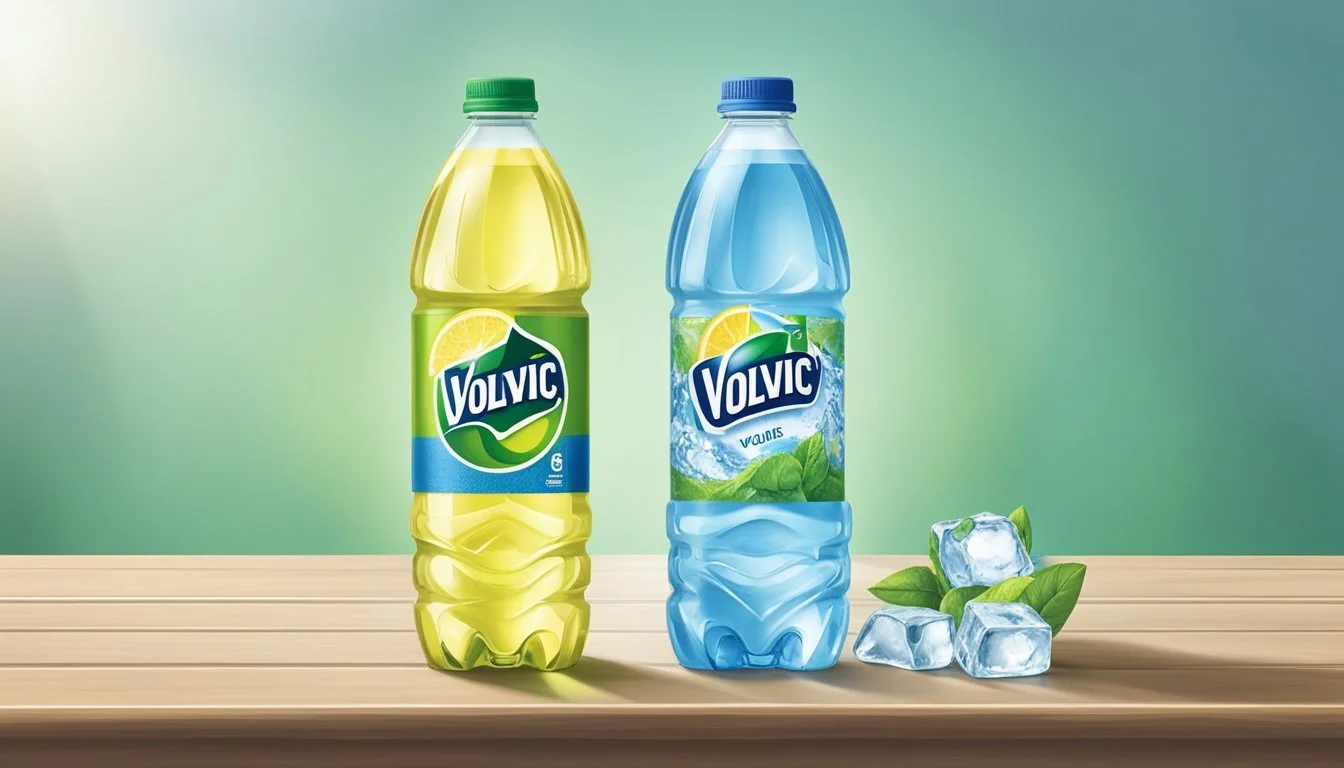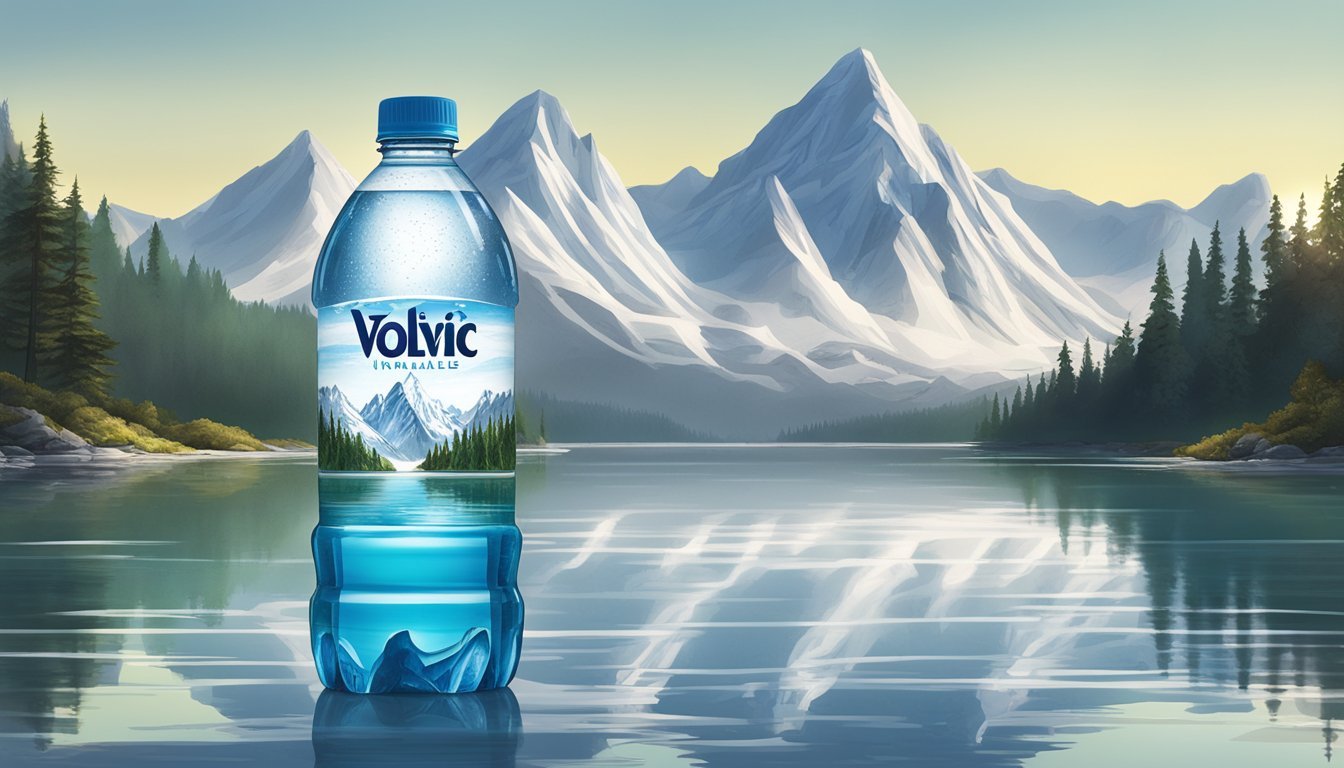Ice Mountain vs. Volvic
Comparing Quality and Taste for the Best Bottled Water Choice
In the realm of bottled water, consumers face an array of choices, each boasting their own unique source, mineral content, and taste profile. Among the myriad options, Ice Mountain and Volvic stand out as popular choices for hydration. Ice Mountain, sourced from springs across the Midwest of the United States, is often lauded for its accessibility and affordability, while Volvic, which hails from the volcanic region of Auvergne in France, is celebrated for its volcanic filtration process that naturally enriches the water with minerals.
While both Ice Mountain and Volvic deliver on the promise of clean, bottled water, there’s a debate among consumers about which brand offers a superior product. This comparison isn’t just about taste; it also encompasses factors like the source of the water, the bottling process, its environmental impact, and the overall health benefits. Ice Mountain’s appeal lies in its regional sourcing and its taste, which many find to be neutral and refreshing. On the other hand, Volvic's mineral-rich composition — a result of its unique geological origins — provides a distinct flavor that its drinkers may prefer for both taste and mineral content.
Thus, the choice between Ice Mountain and Volvic transcends mere preference for flavor, involving a deeper consideration of what constitutes quality in bottled water. Consumers must weigh each brand's merits in terms of sustainability, the purity of the source, and the health implications of their respective mineral profiles. As they navigate this decision, they arm themselves with the knowledge of what each brand represents and how it aligns with their personal values and needs for hydration.
Comparison of Ice Mountain and Volvic
Ice Mountain and Volvic are reputable bottled water brands that offer unique selling points in terms of their natural sources, quality, and taste profiles. This section distinguishes the two based on critical aspects that drive consumer preferences.
Water Source and Natural Composition
Ice Mountain natural spring water is sourced from various springs throughout the Midwest of the United States. It predominantly consists of groundwater that is filtered naturally. Volvic, on the other hand, is sourced from volcanic regions in France, which imparts a unique mineral composition due to its volcanic filtration.
Health and Safety Standards
Both Ice Mountain and Volvic adhere to strict health and safety standards. Quality reports from these brands show compliance with the International Bottled Water Association and meet FDA regulations, ensuring their products are free from harmful levels of contaminants, heavy metals like arsenic and lead, and bacteria.
Taste and Sensory Experience
Taste profiles can vary; Ice Mountain is often described as having a crisp and refreshing taste, characteristic of traditional spring water. Volvic is known for its smooth and naturally sweet taste due to its unique volcanic mineral content.
Environmental Impact and Sustainability
Volvic touts a commitment to sustainability through initiatives aimed at reducing carbon footprint and using bottles made from recycled materials. Ice Mountain also engages in sustainability efforts however, the environmental impact of bottled water, including these brands, remains a point of concern due to the use of plastic and the associated carbon footprint.
Consumer Convenience and Accessibility
In terms of consumer convenience, Ice Mountain is widely available across the United States, often found in large retail chains. Volvic has a significant market presence in Europe and is also exported globally but may be less accessible in some regions.
Corporate Responsibility and Ethics
Both companies are under the umbrellas of larger corporations, Nestlé for Ice Mountain and the Danone Group for Volic. These parent companies have faced scrutiny regarding corporate responsibility, particularly with the sourcing and ethical implications surrounding water extraction.
Market Presence and Brand Recognition
Ice Mountain is part of Nestlé's extensive portfolio of water brands, which includes names like Perrier and Poland Spring. Volvic, although lesser-known than some of Nestlé's brands, has a strong market presence, especially in regions where consumers prefer mineral-rich volcanic water.
Certifications and Quality Assurance
Each brand showcases various certifications and seals on their packaging to convey commitment to quality. Ice Mountain and Volvic are both certified by the International Bottled Water Association, indicating they have passed rigorous inspection and testing.
Product Variety and Innovation
Both brands offer a range of products beside their original spring water. Volvic has ventured into flavored and carbonated waters, while Ice Mountain provides offerings that include both still and sparkling varieties, such as the Ice Mountain Sparkling Natural Spring Water. Additionally, Ice Mountain brand shares commonalities with Nestlé's other products like Arrowhead Mountain Spring Water.
Detailed Analysis of Water Composition
This section provides a factual comparison of Ice Mountain and Volvic bottled waters based on their mineral content, pH levels, contaminants, filtration processes, purity, health implications, and taste.
Mineral Content and pH Levels
Ice Mountain water, typically sourced from springs in the Midwest, has a balanced mineral composition conducive to good taste and hydration. Its pH levels are generally close to neutral, suggesting a balance between acidity and alkalinity that suits regular consumption. Volvic water, originating from volcanic regions in France, contains unique volcanic minerals and boasts a slightly alkaline pH, which some consumers seek for its alleged health benefits.
Presence of Contaminants
Volvic and Ice Mountain waters undergo rigorous testing to ensure the absence of harmful levels of heavy metals like lead and arsenic. Both brands have been reported to contain trace amounts of PFAS chemicals, but within regulatory safety limits. The commitment to maintaining low contaminant levels is a key aspect of both brands’ market reputation.
Comparison of Filtration Processes
Ice Mountain employs a multi-step filtration process, including micron filters and UV light treatment. Volvic's Hydro-7 filtration system is a proprietary method claimed to remove impurities while preserving beneficial minerals. Both brands strive to eliminate undesirable organic compounds, ensuring safety and consistency in their bottled water products.
Assessment of Bottled Water Purity
Purity is a vital aspect of bottled water quality, and both Ice Mountain and Volvic conduct exhaustive tests to verify their products are free from environmental pollutants and contaminants. Regular assessments are performed to ensure their water meets or exceeds industry standards for purity.
Health Implications of Consumption
The consumption of either Ice Mountain or Volvic bottled water contributes to hydration without imposing significant health risks from contaminants. Their mineral content can supplement a balanced diet, but consumers should not rely solely on bottled water for mineral intake. Health-conscious individuals often turn to bottled water as a safe alternative to tap water, and both these brands are considered a healthy choice.
Taste Profiling of Ice Mountain and Volvic
Taste is subjective, yet crucial in determining consumer preference for bottled water. Ice Mountain is known for a crisp, refreshing taste, while Volvic is characterized by its smooth, slightly mineral-forward profile. Taste tests suggest neither brand has a significant edge over the other; preference is largely determined by individual consumers' taste buds and mineral palate.
Environmental and Health Regulations
The evaluation of Ice Mountain and Volvic bottled water necessitates an understanding of industry regulations for health and environmental stewardship. Both brands are subject to international standards, and their compliance affects not only safety but sustainability efforts as well.
Bottled Water Industry Standards
The International Bottled Water Association (IBWA) sets forth guidelines that its member companies, which include many bottled water brands, are encouraged to follow. These standards often exceed governmental regulations. For bottled water, critical contaminants such as lead, arsenic, and bacteria are monitored with stringent testing frequencies and thresholds.
Lead: The FDA's limit for bottled water is three times stricter than the EPA's standard for tap water.
Arsenic: IBWA dictates a maximum allowable level of 10 parts per billion, aligning with EPA and FDA standards.
Environmental Protection and Policies
The production of bottled water impacts the environment in several ways, mostly related to resource extraction and the carbon footprint of production and distribution. Sustainability is a concern, and policies are in place to mitigate negative effects:
Resource extraction: Sustainable sourcing of water is monitored to avoid over-exploitation of water sources.
Carbon footprint: Brands are encouraged to reduce emissions through efficient transportation and manufacturing processes.
Health Risks and Safety Measures
Bottled water safety relies on both the monitoring of potential contaminants and the implementation of safety measures during the entire bottling process. Compliance with FDA and other global standards ensures that Ice Mountain and Volvic maintain the health of their consumers.
Contaminants: Regular testing for pollutants, including microplastics, is essential for consumer safety.
Safety measures: Rigorous filtration processes are applied to reduce the presence of harmful substances in the final product.
Consumer Preferences and Behavior
When choosing between Ice Mountain and Volvic, consumers' preferences and purchasing behaviors are influenced by a variety of factors.
Demographics and Buying Motives
Consumers select bottled water brands like Ice Mountain and Volvic for a multitude of reasons that vary by demographics such as age, income level, and location. Younger consumers might prioritize convenience and trendiness, while older demographics could value health and purity in water. Affluent buyers are often willing to pay a premium for brands perceived as luxurious or of higher quality, like Volvic, which is marketed as a premium brand, while those seeking value for money might opt for Ice Mountain.
Taste Perception and Brand Loyalty
Taste is a primary factor for many consumers, visibly impacting brand loyalty. Volvic is often described as having a clean and fresh taste, which might appeal to consumers looking for a less mineralized flavor profile. On the other hand, consumers loyal to Ice Mountain appreciate its perceived natural purity and potentially less processed taste. Once a consumer develops a preference for the taste of a particular brand of water, they are more likely to repeatedly purchase it, reinforcing brand loyalty.
Impact of Packaging on Purchasing Decisions
The type of packaging plays a significant role in bottled water selection. Ice Mountain, like many other brands, is known to use plastic bottles, which raises concerns over BPA content for some consumers. Volvic, meanwhile, promotes its BPA-free bottles, potentially swaying health-conscious consumers. Aesthetic appeal, bottle size, and convenience of packaging also influence which brand shoppers choose off the shelf.
Trends in Bottled Water Consumption
Trends indicate a growing interest in specialty waters, including alkaline and flavored varieties. Both Ice Mountain and Volvic have responded to this shift; Ice Mountain by offering flavored options that cater to convenience-seeking individuals, and Volvic by emphasizing the natural alkalinity of its volcanic filtration process. This pivot to meet emerging trends is critical to both brands' ability to maintain relevance in a competitive bottled water market.
Economic Aspects of Bottled Water Consumption
The economic intricacies of bottled water consumption encompass individual cost considerations, contributions to the market economy, and the international trade dynamics that influence availability and pricing.
Cost Comparison and Affordability
When comparing Ice Mountain and Volvic, consumers notice discrepancies in pricing. Ice Mountain, sourced in the Midwest, generally presents a lower cost to American consumers due to reduced transportation expenses. Volvic, a French brand, has a higher price point, partly due to import costs. This affects affordability, especially when buying in bulk.
Industry Revenue and Market Share
Ice Mountain is part of the Nestlé family of brands, which holds a significant portion of the bottled water market share in the United States. In contrast, Volvic contributes to the revenue of Danone, a major player in the international bottled water market. The bottled water industry has seen a steady increase in revenue, with a projection of continued growth, reflecting bottled water's increasing popularity.
Impact of Import and Export Dynamics
Volvic's presence in the U.S. market is subject to import dynamics, including trade agreements and tariffs, which can affect its retail price. Conversely, as a domestic product, Ice Mountain is insulated from these factors but is part of export dynamics when it enters international markets. Both brands contribute to a global bottled water industry impacted by changing economic relationships between countries.
Final Assessment and Recommendations
In this final section, readers will find a detailed comparison of Ice Mountain and Volvic waters, synthesizing the prior analysis with expert insights to offer clear purchasing guidance.
Summary of Key Findings
Ice Mountain adheres to FDA and IBWA standards and is generally considered safe for consumption. It's sourced from springs across the Midwest and offers an affordable option. However, environmental and microplastic concerns are associated with it. Volvic, sourced from the Auvergne region in France, is known for its mineral content and taste, often preferred by consumers looking for a premium water experience.
Expert Recommendations
Experts tend to recommend Volvic over Ice Mountain for consumers prioritizing taste and mineral content. They suggest Ice Mountain as a cost-effective alternative for daily hydration needs, emphasizing the need for more sustainable packaging options from both brands.
Ice Mountain:
Pros: Cost-effective, widely available
Cons: Microplastic contamination, environmental impact
Volvic:
Pros: Unique mineral content, preferred taste
Cons: Higher price point, less accessible than domestic brands
Bottom Line for Consumers
When choosing the best bottled water, consumers should consider both safety and taste alongside environmental impact. Ice Mountain might serve well for budget-conscious buyers, while Volvic could be the choice for those desiring a distinct flavor and mineral infusion. It’s suggested to balance these priorities with personal values and lifestyle needs to make the most informed decision.
Appendices
This section provides supplementary materials for readers interested in the detailed comparisons between Ice Mountain and Volvic water brands. It includes factual documentation, avenues for inquiry, and information about the expertise behind the analysis.
Water Quality Reports and Documentation
Both Ice Mountain and Volvic maintain a transparency policy regarding their water quality. Consumers can access their respective water quality reports, typically available in PDF format:
Ice Mountain: The brand offers comprehensive quality reports annually which detail the mineral content and purity levels of the water.
Volvic: Similar to Ice Mountain, Volvic makes its detailed reports on water quality available for public review.
Contact Information
For further inquiries or clarification, readers may contact each company directly. The following are the primary points of contact:
Ice Mountain:
Email: info@icemountain.com
Twitter: @IceMountainWtr
Volvic:
Email: contact@volvic.com
Signal: (Provided for secure communications)
About the Author
The comparison between Ice Mountain and Volvic has been carried out by Ryan Felton, an investigative journalist with a keen interest in environmental issues and consumer rights. Felton’s authoritative stance on water quality and brand evaluations is backed by:
In-depth research into bottled water industry practices.
Analysis of scientific data regarding water purity and mineral content.
References and Further Reading
For those interested in the specifics of bottled water brands, such as Ice Mountain and Volvic, it is useful to consult a variety of sources for a well-rounded understanding of their quality and characteristics.
Environmental Working Group: Offers a comprehensive view on bottled water, including Volvic and Ice Mountain, through test results and purity claims analysis. Title: "Is Your Bottled Water Worth It?"
The Delite: Provides a ranking of various bottled water brands, including critique on additives and treatment. Title: "Bottled Water Brands: Ranked From Worst To Best."
Alkaline Water Plus: Reviews different brands while focusing on aspects like pH level and the presence of contaminants. Title: "Analyzing & Comparing Brands of Bottled Water."
TODAY: Features a list that ranks bottled waters, offering quick takes on the pros and cons of each, including a review of Icelandic Glacial, which is comparable in market segment to Ice Mountain and Volvic. Title: "17 Bottled Waters, Ranked Worst to Best."
Researchers should note that claims made by manufacturers may not always be fully substantiated, so cross-referencing with independent reviews and studies can provide a more accurate portrayal of the product. Furthermore, environmental impact reports and certifications can support a deeper understanding of the sustainability practices of bottled water companies.







